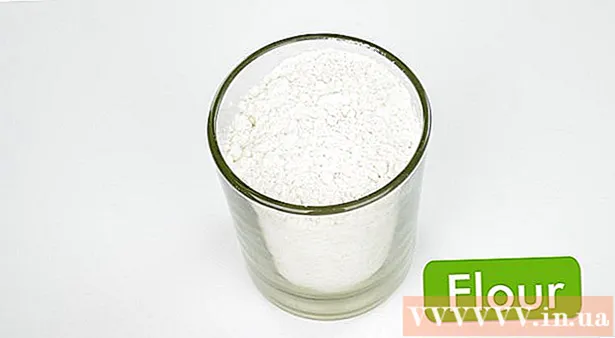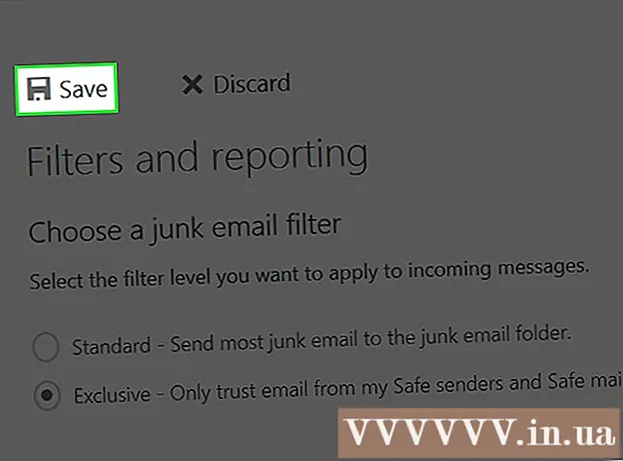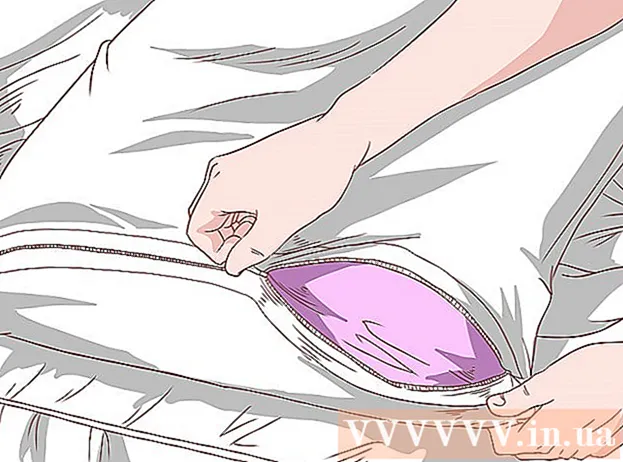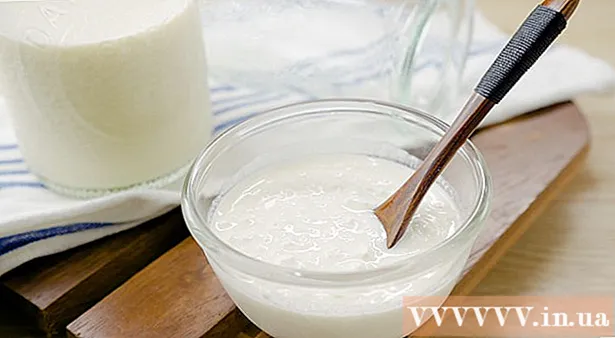Author:
Ellen Moore
Date Of Creation:
19 January 2021
Update Date:
1 July 2024

Content
- Steps
- Method 1 of 2: Store the cylinder safely
- Method 2 of 2: Checking the quality of the cylinder
- Warnings
Propane is commonly used in gas grills, so propane cylinders can be found in many homes. Since propane is a highly flammable gas, it must be stored outdoors for safety reasons. When stored properly, a gas cylinder can be kept in good condition for many years. Before storing the cylinder, make sure that it is not damaged.
Steps
Method 1 of 2: Store the cylinder safely
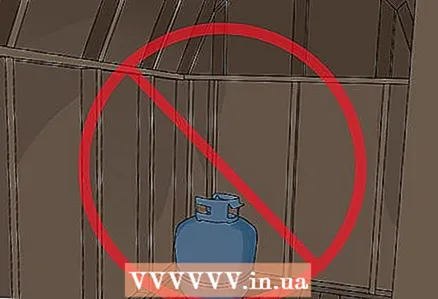 1 Do not leave the bottle in your home or shed. A gas leak can pollute the area, making it dangerous. Even a spark from a car or lawn mower engine can ignite propane.
1 Do not leave the bottle in your home or shed. A gas leak can pollute the area, making it dangerous. Even a spark from a car or lawn mower engine can ignite propane. - If you live in an area where it snows a lot, mark the location of the cylinder in case it gets covered with snow so you can easily find and clear the snow.
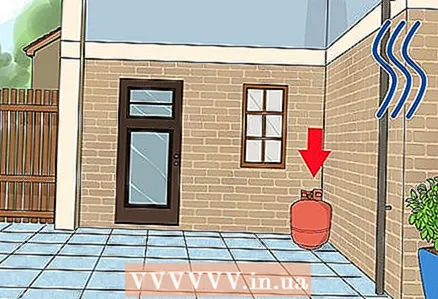 2 Store the cylinder outdoors in a dry, well-ventilated place. Store the cylinder in the shade and on a level surface so that it does not tip over or roll. For example, a cylinder can be placed on the bottom shelf of a rack attached to an outer wall.
2 Store the cylinder outdoors in a dry, well-ventilated place. Store the cylinder in the shade and on a level surface so that it does not tip over or roll. For example, a cylinder can be placed on the bottom shelf of a rack attached to an outer wall. - Do not store the cylinder in an enclosed area. Gas can escape and make the area dangerous.
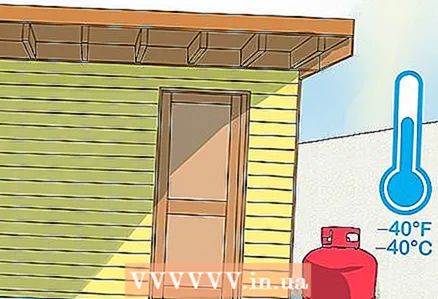 3 Make sure that the cylinder temperature does not drop below –40 ° C in winter. With a decrease in temperature, the pressure in the cylinder will also begin to decrease. Transfer the balloon to a well-lit place so that the sun warms it up every day.
3 Make sure that the cylinder temperature does not drop below –40 ° C in winter. With a decrease in temperature, the pressure in the cylinder will also begin to decrease. Transfer the balloon to a well-lit place so that the sun warms it up every day. - Make sure the cylinder is full and the pressure inside does not drop too low.
- Do not cover the cylinder in an attempt to warm it up. By doing this, you will only hide it from the sun, which will lead to an even greater drop in pressure.
- Never use a heater or electrical appliance to heat the cylinder.
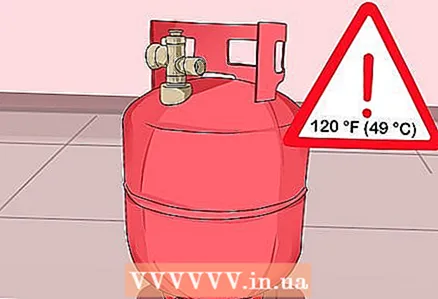 4 Do not store the cylinder at temperatures above 49 ° C. As the temperature rises, the pressure in the cylinder will begin to increase. Do not leave the balloon in the sun in summer. Instead, find a shaded area and leave it there.
4 Do not store the cylinder at temperatures above 49 ° C. As the temperature rises, the pressure in the cylinder will begin to increase. Do not leave the balloon in the sun in summer. Instead, find a shaded area and leave it there. - The gas cylinder has a release valve that can be used to reduce the pressure in case of too high temperature. The accumulated pressure will begin to flow out and dissipate in the air. Make sure that there are no sources of ignition near the cylinder so that the gas does not ignite.
 5 Store the cylinder at least 3 meters away from flammable materials. This includes sources of open flames and various electrical appliances. Do not store excess cylinders next to each other or near the grill. If one cylinder accidentally catches fire, it is better that the others are not standing nearby.
5 Store the cylinder at least 3 meters away from flammable materials. This includes sources of open flames and various electrical appliances. Do not store excess cylinders next to each other or near the grill. If one cylinder accidentally catches fire, it is better that the others are not standing nearby. 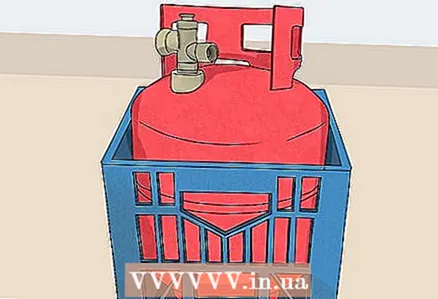 6 Store the can in the milk crate so that it is upright. This position of the cylinder ensures that the valves are not damaged and the gas does not leak out. A standard sized milk crate can hold a 10 kg bottle, which is often used for gas grills.
6 Store the can in the milk crate so that it is upright. This position of the cylinder ensures that the valves are not damaged and the gas does not leak out. A standard sized milk crate can hold a 10 kg bottle, which is often used for gas grills. - Special platforms for storing propane cylinders can also be purchased at hardware and garden stores, or ordered online. Use a platform if the cylinder will not fit in the box.
- Use concrete blocks or bricks to build a kind of barrier around the balloon, but never block the valve or handles.
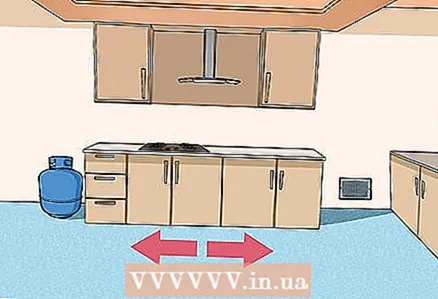 7 Do not leave the bottle near windows and vents. Look for ventilation grills near the gas cylinder. Propane is heavier than air, so it will sink lower and can penetrate the ventilation grills and basement windows. Do not leave the cylinder in a place where, if the cylinder leaks, gas can easily enter the house and spoil the air.
7 Do not leave the bottle near windows and vents. Look for ventilation grills near the gas cylinder. Propane is heavier than air, so it will sink lower and can penetrate the ventilation grills and basement windows. Do not leave the cylinder in a place where, if the cylinder leaks, gas can easily enter the house and spoil the air. - Never leave a gas cylinder near air conditioners, radiators or heat recovery ventilation systems, as they can draw gas into the house.
- If a propane leak occurs in your home, leave the building immediately and contact your local services.
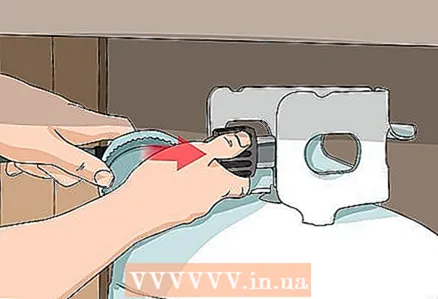 8 Attach the can to your grill for easier storage. Shut off the gas supply using the valve at the top of the cylinder. Cover the canister with a grill cover to protect it from inclement weather and direct sunlight. This will make it easier to use your grill at any time of the year.
8 Attach the can to your grill for easier storage. Shut off the gas supply using the valve at the top of the cylinder. Cover the canister with a grill cover to protect it from inclement weather and direct sunlight. This will make it easier to use your grill at any time of the year. - If you store your grill in a barn or garage, disconnect the cylinder and place it outside.
Method 2 of 2: Checking the quality of the cylinder
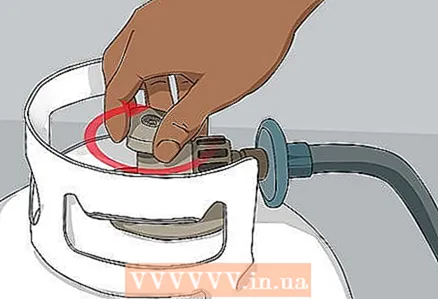 1 Close the valve when not in use. Turn the valve clockwise until it stops. This will prevent a possible gas leak from the cylinder.
1 Close the valve when not in use. Turn the valve clockwise until it stops. This will prevent a possible gas leak from the cylinder. - If you smell rotten eggs, gas may be leaking from the cylinder.
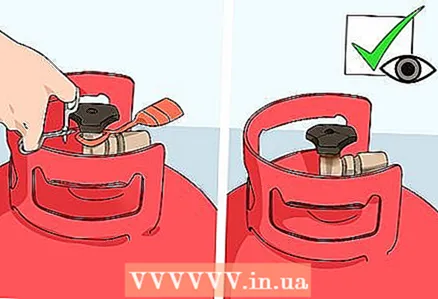 2 Remove the labels to find rust. Use scissors to cut the plastic wrap around the bottle. Sometimes water can get underneath it and lead to rust. Rust can compromise the integrity of the cylinder and make it more susceptible to damage.
2 Remove the labels to find rust. Use scissors to cut the plastic wrap around the bottle. Sometimes water can get underneath it and lead to rust. Rust can compromise the integrity of the cylinder and make it more susceptible to damage. - Do not discard the label as it contains important instructions and instructions for handling the cylinder that you may need later.
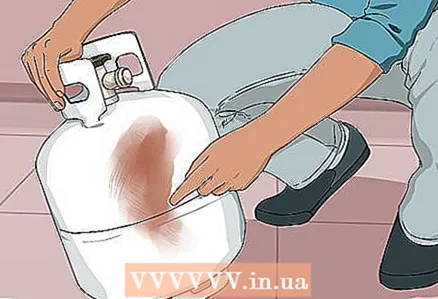 3 Inspect the can for dents and paint peels. Any external damage can compromise the overall integrity of the gas cylinder. If you find traces of rust, dents, or paint peeling, replace the can before storing it.
3 Inspect the can for dents and paint peels. Any external damage can compromise the overall integrity of the gas cylinder. If you find traces of rust, dents, or paint peeling, replace the can before storing it. - Do not fill a worn or damaged cylinder with gas.
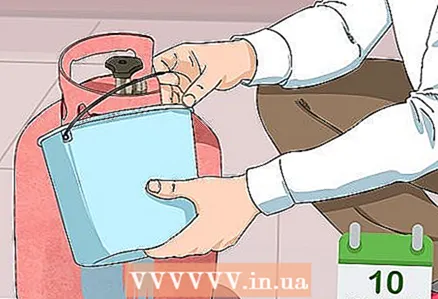 4 Take the cylinder for inspection to a specialist if he is more than 10 years old. The old cylinder should be checked to make sure it is safe. Even if no damage is visible, there is a possibility of internal wear.
4 Take the cylinder for inspection to a specialist if he is more than 10 years old. The old cylinder should be checked to make sure it is safe. Even if no damage is visible, there is a possibility of internal wear. - After initial inspection, the cylinder should be sent for inspection every 5 years.
Warnings
- Liquid propane is highly flammable and is under incredibly high pressure in the cylinder. Keep it away from sources of flame so that it does not catch fire or explode.
- Propane has a very unpleasant smell, reminiscent of rotten eggs. If you smell this odor, do not do anything that could ignite the gas or cause a spark, and leave the hazardous area immediately.
